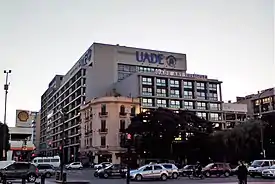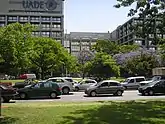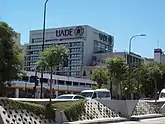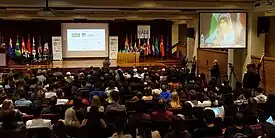Universidad Argentina de la Empresa
Argentine University of Enterprise (Spanish: Universidad Argentina de la Empresa, UADE) is a private university in Buenos Aires, Argentina. It was founded by the Argentine Chamber of Corporations.[2][3]
Universidad Argentina de la Empresa | |
 | |
Former names | Higher Institute for Business Studies |
|---|---|
| Motto | Una gran universidad |
Motto in English | A great university |
| Type | Private |
| Established | 1963 |
| President | Héctor Masoero |
| Vice-president | Carlos San Millán |
| Rector | Ricardo Orosco |
Academic staff | 1,877 |
| Students | 33,000[1] |
| Undergraduates | 28,000 |
| Postgraduates | 5,000 |
| Location | , Argentina 34.6167°S 58.3817°W |
| Campus | Urban |
| Colors | |
| Website | www |

It has campuses in Buenos Aires and Pinamar. The Buenos Aires campus features 75,000 square metres (810,000 sq ft) of classrooms, laboratories, library, sports centre, theatre, food court and a residence hall.[4][5] As of 2020, it had 33,000 undergraduate and postgraduate students and 1,877 professors.[1]
History

UADE was founded in 1957 by members of the Cámara Argentina de Sociedades Anónimas as the Instituto Superior de Estudios de la Empresa. Its activities began in the building of Belgrano Av. 687 under the direction of Dr. Jacob Wainer, and with a total of 338 business executives enrolled. The first class was delivered by Dr. Anwar Obeid who spoke about "The corporation: its importance and influence in the development of the modern world." At the end of that year, to arrange education and higher education in a comprehensive manner, the Institute became the Argentina Foundation for Advanced Business Studies. It aimed to promote training in all disciplines related to the development of social enterprise as an economic institution, considering the specific problems of the real business in Argentina.Around 500 business leaders completed the course in 1958 and the following year, in a large ceremony held at the Plaza Hotel in Buenos Aires, the course for 1959 was opened. At the event, the Minister of Economy, Dr. William W. Klein, the Secretary of State for Trade, Dr. Joseph C. Orfila, and the Minister of Education and Justice, Dr. Luis Mac Kay (who spoke on behalf of the President of the Republic, Dr. Arturo Frondizi) delivered their speeches. The growth process was consolidated in 1962 when, in the context of the Law 14,557 of 1958 authorizing the operation of private universities in the country, the Chamber of Corporations decided to create the UNIVERSIDAD ARGENTINA DE LA EMPRESA, whose statutes were approved by that institution on June 7, 1963, and the National Executive Power on August 27 of that year.

In 1963, the first degrees were offered in areas of special interest for business: "Marketing," "Costs", "Finance and Organisation", "Organisation of Production" and "Industrial Relations" . In 1964 other degrees were added, such as "Business Applied Statistics", "Market Research", "Public Relations", "Management Techniques" and "Production Engineering and Construction Organization."
In 1968, the Universidad Argentina de la Empresa joined the Council of Rectors of Private Universities (CRUP), after Law 17,604 passed in that year, institutionalizing the agency's performance in the education activities of Argentina, recognizing it as a representative body in the planning and action of the private sector, and acting as an adviser for the National Executive Power.
In 1984, the headquarters at Lima St. 717 were inaugurated and, subsequently, in 1992, 1993, 1997, and 1998 new buildings were added to create the current building complex on Lima St., functionally integrated, bringing all the faculties and departments of the university together. In 2000 the Faculty and Alumni Club was added in an annex building on Chile St., thus extending the facilities that make the UADE urban campus the most modern in Argentina. In 2003, the School of Management (EDDE) was opened on Freedom St. 1340, with the purpose of developing a new business generation in the country. Finally, in 2005, the UADE University Residence was opened, which is capable of accommodating 105 local and foreign students.
In 2008, the Urban Campus UADE was opened. The campus includes a residence hall, a model library, a cultural and exhibition centre, a sports centre, and a microstage with capacity for 1,200 people, which with the 181 classrooms and laboratories account for more than 75,000 square metres (810,000 sq ft).
In 2009, UADE and CONICET, the main body for the promotion of science and technology in Argentina, signed an Agreement on Scientific and Technological Cooperation which will develop an extensive interaction between the two institutions. In this regard, co-financing will be sought with the CONICET doctoral fellowships as well as the possibility that researchers from this body can develop their work of study in UADE.

Finally, the UADE Labs were set up in May 2010. This is a building of 9000 m2 which is presented to national and regional level as the first integrated university laboratory building in the country. In it, students in 51 undergraduate and graduate programs will attend 60,000 hours of practice and research annually.[6]
It is recognized worldwide by the Association of Collegiate Business Schools and Programs, the Public Relations Society of America, International Advertising Association and Tourism Education Quality.
Background
.jpg.webp)
UADE was created by the Argentine Chamber of Corporations with the aim of training professionals to adapt to the growing needs of current and future companies.[7]
Ranking
According to the QS World University Rankings, UADE is the eighth best private university in the country and is ranked sixth in Buenos Aires, being the only one with an urban campus in that city.[8]
Undergraduate degrees
Complete list of degree programs:[9]
School of Architecture and Design
- BA in Architecture
- BA Audiovisual Design
- BA in Interior Design
- BA in Graphic Design
- BA in Industrial Design
- BA in Multimedia and Interaction Design
- BA in Textile and Apparel Design
- BA Design and Managenent of Aesthetic's for Fashion
School of Communication
- BA in Performing Arts
- BA in Communication Sciences
- BA in Digital and Interactive Communication
- BA in Global Communication
- BA in Gastronomy
- BA in Media and Entertainment Management
- BA in Advertising
- BA in Public and Institutional Relations
- BA in Tourism and Hotel Management
- BA in Sports management
School of Economics
- BA in Accountancy
- BA in Business management
- BA in Marketing
- BA in International trade
- BA in Global business management
- BA in Global finance management
- BA in Economics
- BA in Finance
- BA in Human resources
- BA in Digital business
School of Engineering and Science
- BA in Environmental management
- BA in Information technology management
- BA in Bioinformatics
- BA in Biotechnology
- Electronic engineering
- BA in Computer engineering
- BA in Electromechanic engineering
- BA in Food engineering
- BA in Food industrial technology
- BA in Video game development
- BA in Industrial engineering
- Ba in Agricultural production and management
School of Law and Social Sciences
- BA in Law
- BA in Government and international relations
- BA in Politics and public administration
- BA in Public translation in English language
School of Health Sciences
- BA in Health services management
- BA in Nutrition
- BA in Psychology
Postgraduate degrees
Complete list of degree programs:[10]
- PhD in Economics
- Master of Business Administration
- Master in Institutional communications management
- Master of Finance and control management
- Master of Human resources management
- Master in Strategic information management
- Master of Business management
- Master of Business law
- Master of Applied economics
- Master of Information technology and communications
UADE Business School
UADE business school offers management and business training programs aimed at developing technical, managerial and leadership skills. It aim to generate a high impact on the organization and enhance the professional growth of the participants.[11]
UADE Business School is among the business schools in the country.[12]
Sports
UADE students can participate in a wide variety of extracurricular proposals designed to complement the study, meet students from other careers and exchange experiences.[13]
At the university gym, students have the possibility of receiving personalized attention from a specialized team of high-performance professors and graduates.[13]
The university offers an important space for sports. Within the campus, there is a microstadium with capacity for 1,200 people. It includes a basketball court with international regulatory measures, a volleyball court, while the rebuttable stands leave room for the practice of handball and football.[13]
Subdivisions
UADE Labs
UADE Labs is the first comprehensive technological building in Argentina, equipped with laboratories for teaching and research in biosciences, hard sciences, design subjects, and the rest of UADE's disciplines.[14]
It has 9,000 square meters, distributed in 11 upper floors and three basements.[14]
UADE Art
UADE Art is a Contemporary Art Center, made up of three exhibition rooms and an open-air amphitheater. [15]
UADE HUB
UADE HUB is the area that promotes entrepreneurship and innovation. There is an Entrepreneurs Club that has more than 3,200 members made up of students and graduates who have an idea, a project or an ongoing venture. It is accompanied in this process with support, linking, training, technical assistance in specific needs, networking, motivation and three coworking spaces for students.[16]
Investigation
At UADE, research activities are articulated and managed through the Research Coordination, a unit that depends on the Academic Secretary of the university.[3]
Research activities are developed within the framework of 3 Institutes, the Institute of Economics, the Institute of Social Sciences and Project Disciplines and the Institute of Technology.[3]
References
- "Study BA - Fundación UADE".
- "UADE | la Universidad: Historia".
- "Investigación en UADE".
- "UADE | la Universidad".
- UADE. "History" (in Spanish). Retrieved 2020-08-20.
- "Historia - Institucional | UADE - Universidad Argentina de la Empresa". Archived from the original on 2011-09-11. Retrieved 2012-01-17.
- "Información para Empresas | UADE".
- "QS World University Rankings 2021".
- "Programas de grado y pregrado".
- "Maestrías y Doctorado".
- "Capacitación Ejecutiva | UADE Business School".
- "UADE Business School, entre las mejores escuelas de negocio del país".
- "Deportes UADE".
- "UADE Labs".
- "UADE Art".
- "UADE Hub".
 Media related to Universidad Argentina de la Empresa at Wikimedia Commons
Media related to Universidad Argentina de la Empresa at Wikimedia Commons